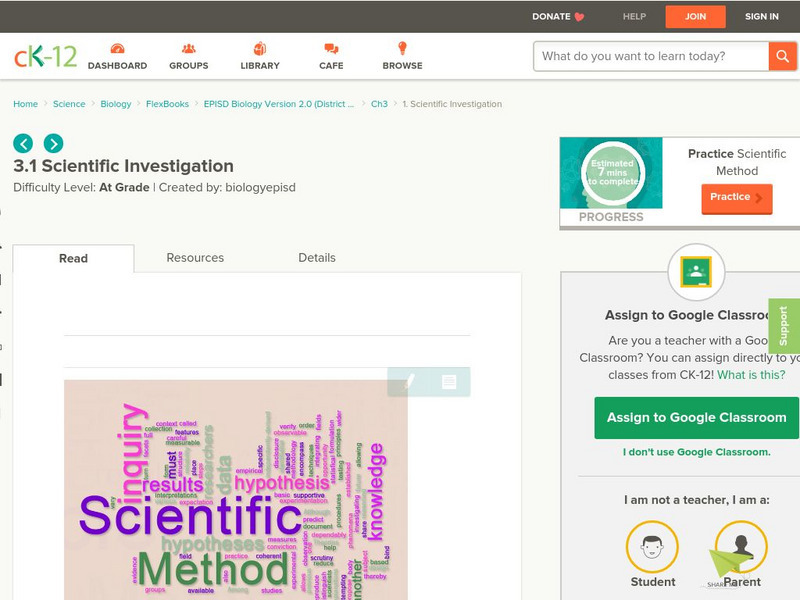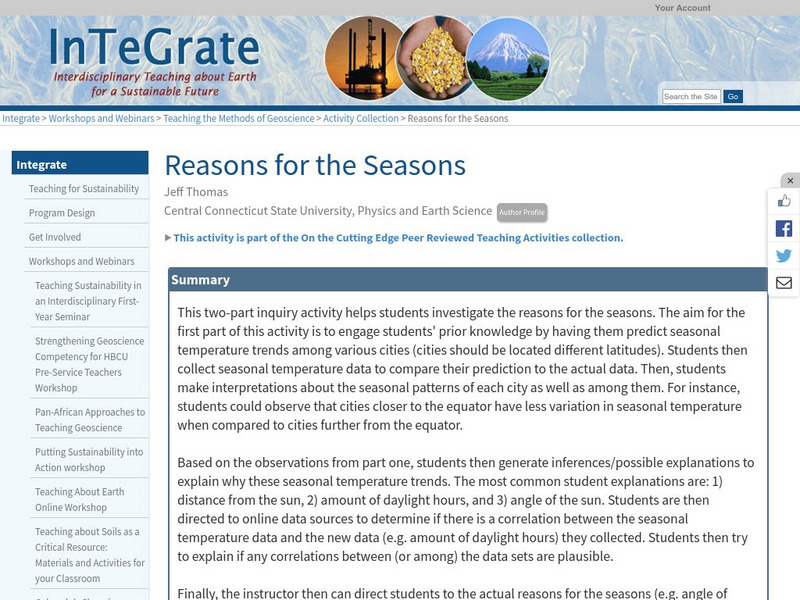Scholastic
Scholastic: Writing With Scientists
After students investigate a topic through research, hypothesizing, observing, and experimentating, teachers can use this lesson to help their students prepare short science reports and publish them online. The Writing with Scientists...
Other
Hong Kong Polytech: Functions in Academic Writing
Provides a wealth of interactive exercises dealing mainly with the structuring of sentences in different kinds of academic writing.
Colorado State University
Colorado State Writing Center: Writing the Scientific Paper
A guide to the world of writing in the scientific field. Includes information about scientific-format papers, abstracts, hypotheses and results, and provides several examples.
University of Wisconsin
University of Wisconsin Madison: Writing Center: Developing a Thesis Statement
This is a well-organized page that allows you to zero in on a particular aspect of stating your hypothesis and writing your thesis statement.
Other
Write Design: Graphic Organizers: Hypothesize
Lists and describes several types of graphic organizers which fall under the "hypothesis" mold, including a hypothesis matrix and a questions chart.
Science Education Resource Center at Carleton College
Serc: Mn Step: Rocks a Lesson in Inquiry
For this activity, students sort and classify rocks in small groups, and record questions they have. The class will sort the questions into investigatory and non-investigatory questions. They will choose one to investigate, make a...
Utah Education Network
Uen: 1st Grade Act. 17: Observing Plants Through a Journal
This lesson engages students in learning about plant growth. Students will observe changes in a growing plant and then will write in their discovery journals to write observations and hypotheses about the plant growth. Students will also...
Science Education Resource Center at Carleton College
Serc: Investigating the Rock Cycle: Looking at Similarities and Diff in Rocks
In this activity students will be given three rocks representing the three main rock types in the rock cycle. They will make observations on those rocks and develop a hypothesis on how each rock formed. We will meet as a class and...
McGraw Hill
Glencoe Publishing: Practicing Scientific Processes
This site from Glencoe Publishing not only explains hypothesis but also tells how to design an experiment to test your hypothesis. Includes the difficult task of "Separating and controlling variables."
Smithsonian Institution
Smithsonian in Your Classroom: Introduction to the Nature Journal [Pdf]
Smithsonian in the Classroom presents "Introduction to the Nature Journal." Teachers can download this comprehensive teaching package in which students will practice and develop their skills of writing observations and making hypotheses....
Smithsonian Institution
Smithsonian in Your Classroom: Introduction to the Nature Journal [Pdf]
Smithsonian in the Classroom presents "Introduction to the Nature Journal." Teachers can download this comprehensive teaching package in which students will practice and develop their skills of writing observations and making hypotheses....
Alabama Learning Exchange
Alex: Bloodstain Pattern Doesn't Lie
Students will formulate a hypothesis about the relationship (linear, direct, indirect, etc.) between the distance a drop of blood falls and the diameter of the splatter it makes. To test their hypothesis, the students will work...
Science Education Resource Center at Carleton College
Serc: Investigating Starch in Foods
This lesson would be used during our nutrition unit when discussing carbohydrates. In this classroom activity learners investigate which foods have starch in them by using iodine, as well as investigate the result of iodine and lemon...
CK-12 Foundation
Ck 12: Scientific Investigation
[Free Registration/Login may be required to access all resource tools.] This lesson looks at how the scientific method is applied in a scientific investigation, and at the differences between theories and hypotheses in science.
Other
Science Fair Primer: Reporting the Results
A good explanation of the elements of a good science fair report written by a high school science teacher. Details are given step by step on stating the hypothesis, explaining the experimental procedure, presenting the data attained, and...
Curated OER
Write Design: Graphic Organizers: Hypothesize
Lists and describes several types of graphic organizers which fall under the "hypothesis" mold, including a hypothesis matrix and a questions chart.
Science Education Resource Center at Carleton College
Serc: Reasons for the Seasons
A well-designed science investigation that has students examine and graph seasonal temperature data from cities at different latitudes. They describe trends they see, and explain what they think causes these trends. They then identify...
SRI International
Performance Assessment Links in Science: Follow Those Tracks
This lesson plan requires students to make an inference (hypothesis) about two animals based on the tracks they leave behind. Students are asked to write a story explaining their inference.
Science Buddies
Science Buddies: Scientific Method Conclusion
The conclusion of a science experiment summarizes how your results supported or contradicted your hypothesis. See a sample of a conclusion and find out what makes a good conclusion.
Curated OER
Write Design: Graphic Organizers: Hypothesize
Lists and describes several types of graphic organizers which fall under the "hypothesis" mold, including a hypothesis matrix and a questions chart.
Science Education Resource Center at Carleton College
Serc: An Investigation Into Geologic Mapping: Quarry Park
In this geology field lab, students will map an area around Quarry 12 and Quarry 13 in Quarry Park. Using a field notebook, students will take field observations to later produce a basic geologic map, topographic map, and a...
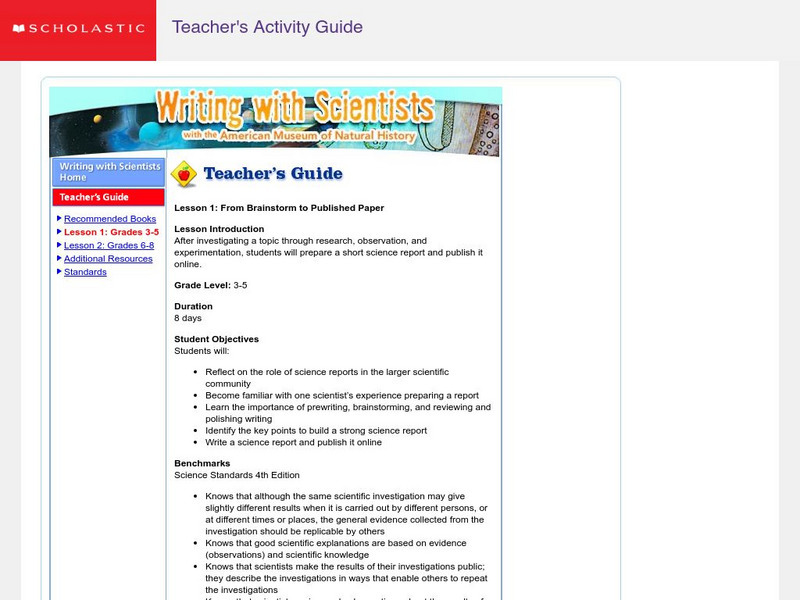

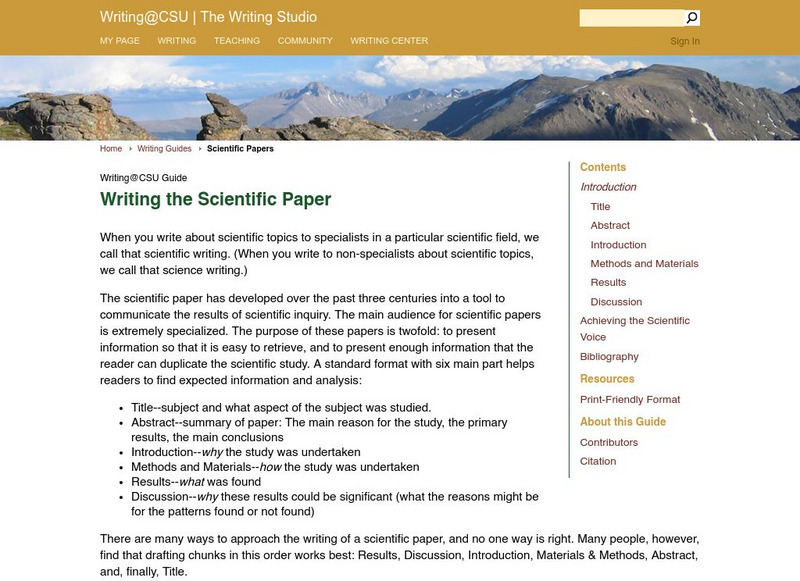
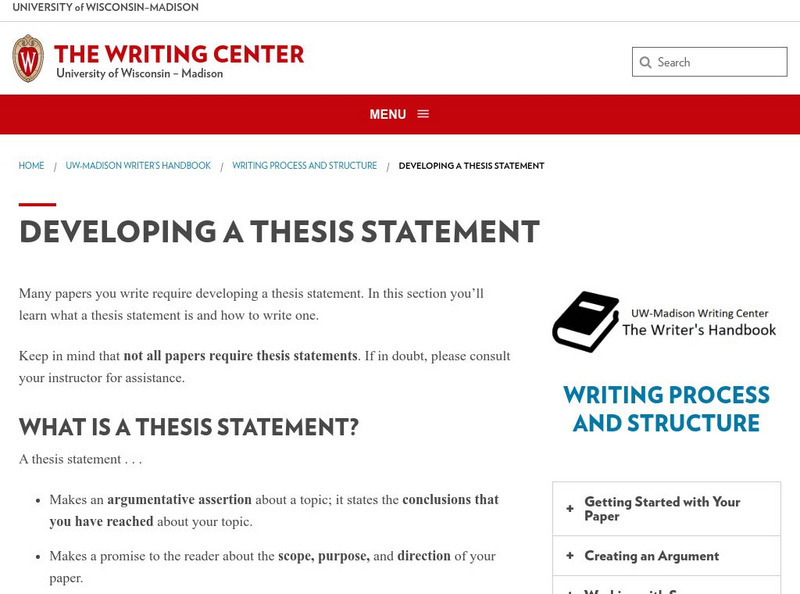





![Smithsonian in Your Classroom: Introduction to the Nature Journal [Pdf] Unit Plan Smithsonian in Your Classroom: Introduction to the Nature Journal [Pdf] Unit Plan](https://static.lp.lexp.cloud/images/attachment_defaults/resource/large/FPO-knovation.png)


